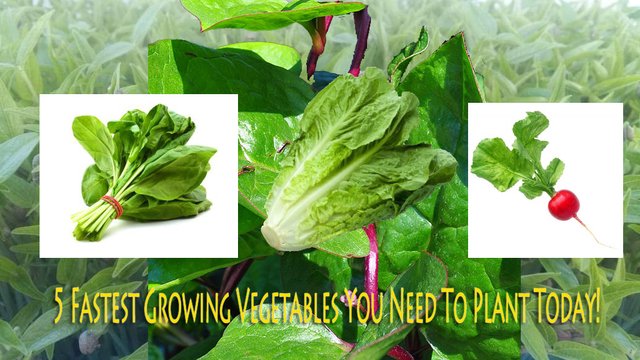5 Fastest Growing and Organic Vegetables You Should Plant NOW!
The fastest way to growing organic vegetables is to plant them asap. As in NOW! You can harvest any kind of vegetables quickly if you are able to plant them as early as you can. Waiting for something to be perfect or the perfect time to do it just pushes the harvest time further and further away.
However, different vegetables have different time of maturation. Some matures early while others matures much way later. So, you might have come to this website searching for vegetable plants that matures early, and that you can harvest in 3-4 weeks if you plant them ASAP!
#1. Micro-Greens or green sprouts.
Green sprouts are one of the most convenient and fastest way to grow and harvest vegetables that provides high nutritional value, especially when they are grown organic, in as little as 5-7 days. Sprouts are full or nutrition and provide a very fresh flavor to any food of your choice. My top 5 organic greens sprouts recommendation you must grow are:
Mung Bean Sprouts,
Radish Sprouts,
Broccoli Sprouts,
Crimson Clover, and
Mustard Sprouts.
#2. Bok choy (American English), pak choi (British English), or pok choi, or Petchay in the Philippines (Brassica rapa subsp. chinensis) is a type of Chinese cabbage.
This type of cabbage varieties do not form heads and have green leaf blades with lighter bulbous bottoms instead, forming a cluster reminiscent of mustard greens. Petchay varieties are popular in southern China and Southeast Asia. Being winter-hardy, they are getting increasingly getting popular in Northern Europe. Now considered a subspecies of Brassica rapa, this group was originally classified as its own species under the name Brassica chinensis by Carl Linnaeus. They are a member of the family of Brassicaceae or Cruciferae, also commonly known as the mustards, the crucifers, or the cabbage family.
Petchay can be gown in small pots, flat beds or raised beds. And can be harvest within 3 weeks. You don't have to mature the plant before harvesting, you can harvest 2 or 3 leaves as soon as it matures, leaving the younger leaves for harvest 2-3 days later. As per my experience, a single plant can last up to 10 harvest before it reach maturation.
#3. Leaf Lettuce
This is the third fastest growing vegetables you can grow right now. Leaf lettuce refers to varieties that don’t produce any type of head. They are easier to grow than other varieties – including romaine, butterhead, and crisphead – and produce multiple harvests throughout the season.
Homegrown lettuce is also more nutritious and flavorful than anything you will find at the grocery store.
Freshly harvested, crisp leaves are highest in vitamin A and potassium. And experimenting with different varieties will open up your palate to new flavors of this leafy green you never knew existed.
#4. Radishes
Radishes are a hardy, very easy-to-grow root vegetable that can be planted multiple times in a growing season. Plus, radishes can be harvested as soon as three weeks after planting! Radishes is the only non-green vegetables that you can harvest within 25 days.
Radish seeds can be planted in both the spring and the fall, but growing should be suspended in the height of summer, when temperatures are typically too hot. (Hot temperatures may cause radishes to bolt, making them essentially useless.) However, if you are planning to plant it during the summer, make sure to plant it inside a green house where you are able to control the heat of the sunlight during mid-day.
Otherwise, radishes are one of the easiest and fastest growing vegetables to grow today.
#5. Spinach and Malabar Spinach
Spinach can be harvest within 30 days. It is the 4th fastest growing vegetables you can grow right now. Malabar spinach is the vine variety of spinach and is commonly grown in tropical climate where there is a lot of rain. It's tasty and can be eaten by making a salad or mixing it with other vegetable recipes.
Malabar spinach (Basella alba or ruba, a redder variety) is actually not spinach at all. It’s not even related! Well, OK, it’s distantly related, but it doesn’t taste much like spinach at all. When it’s raw Malabar spinach has very fleshy, thick leaves that are juicy and crisp with tastes of citrus and pepper. When cooked, though, Malabar spinach does look and taste a lot more like regular spinach. It doesn’t wilt as fast, though, and it holds up better in soups and stir-fries.
It is super easy to grow, too, and it really leaps when the temperatures hit 90°F and over — just the time when the rest of your salad greens are descending into bitterness and grumbling.
As mentioned above, malabar spinach are viny variety, so it would be better to give it something to climb on as it grows. A stick or a trellis would be cool. However, I usually plant them on my fence and allow them to populate along the perimeter area. It's an excellent way of making your property beautiful and at the same time, having extra food you can get anytime.
Malabar spinach can also be planted through cuttings of its vines. If you can’t grow it, then you can probably find it at Asian or Indian groceries. It’s a popular green in Asian, Indian, and even African cuisine — although in Africa they tend to eat the tender vining shoots more than the leaves themselves.
You may also want to check these post about Best Organic Tomato Growing Tip
And How to Plant Organic Garlic
.
